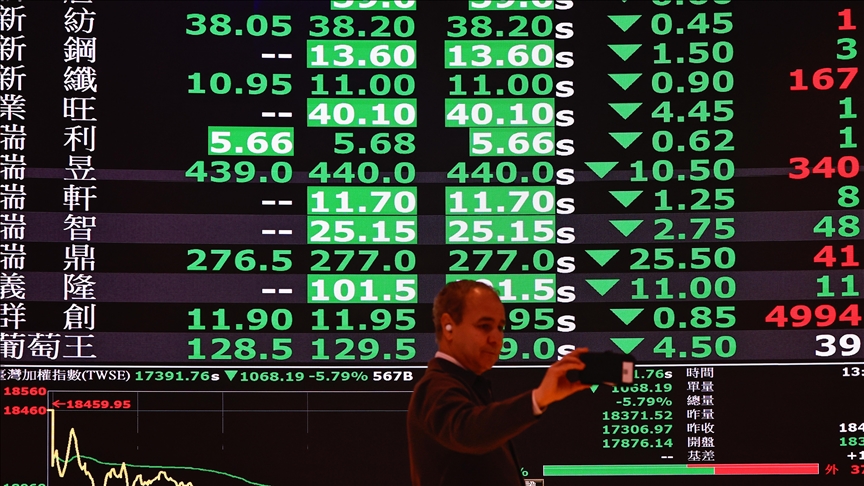Global markets mixed following US strike on Iran nuclear facilities
Gold down 0.3%, Brent crude oil climbs 1.2% on fears of closing of Hormuz Strait, while stock markets fall due to escalated tensions

ISTANBUL
Global markets started the week with a mixed course as the tensions in the Iran-Israel conflict intensified after the US bombed Iran's nuclear facilities on early Saturday, increasing fears of an escalated full-out war.
While the ongoing conflicts between Iran and Israel continued to be the focus of investors, the US launched airstrikes on three nuclear facilities in Iran over the weekend, namely Fordo, Natanz and Isfahan.
US President Donald Trump said Saturday that American forces completed "very successful" airstrikes on three Iranian nuclear sites amid fears of a wider conflagration in the region.
US Vice President JD Vance said in a statement after the strikes that Washington was seeking a diplomatic solution, not continued confrontation with Tehran.
Meanwhile, concerns that the Strait of Hormuz, which allows Middle Eastern oil and liquefied natural gas (LNG) production to be transported to world markets via the Sea of Oman and the Indian Ocean, could be closed after the US airstrike against Iran have gained strength again.
Approximately one-third of the crude oil transported by sea in the world passes through the Strait of Hormuz, while 20% of LNG trade is carried out through this waterway. Asian countries stand out as important buyers of oil shipped from the region.
Iranian officials' remarks on the issue are closely watched, but the parliament has decided that the Strait of Hormuz should be closed, according to Esmaeil Kowsari, a member of the Iranian parliament's National Security Commission, even though the Supreme National Security Council has the last word.
In the US, the stock futures started the new week with a negative course following the developments in the Middle East over the weekend.
While energy supply concerns arising from the conflicts in the Middle East continued to be effective, the price of Brent oil started the new week at $76.85 a barrel, up 1.2% as of 0605GMT. At the same time, the barrel of West Texas (WTI) crude oil also started at $75 with a 1.54% rise.
The ounce price of gold, on the other hand, is currently sold at $3,358, down 0.3%, erasing its gains in the early hours with the effect of the US diplomatic solution messages.
In the European markets, index futures started the new week negatively, where investors were cautious due to possible energy supply problems in the Middle East.
Due to worries that issues with the energy supply might raise prices in the European economy, where manufacturing industry activity and growth issues are still present, investors keep a careful eye on the news flow from the Strait of Hormuz.
On the Asian side, a sales-weighted trend was observed, with the exception of China, and the region's stock markets are impacted by the growing risk perception brought on by the ongoing Middle East tensions.
Asian countries, which receive a significant portion of energy shipments through the Strait of Hormuz, are closely monitoring the news flow regarding the developments in the region.
In the event of a potential Iranian effort to block the strait, it is hoped that some nations will apply penalties on tanker ships rather than closing it entirely, and that Chinese tankers will be less impacted by any sanctions, which supports Chinese indices.
With these developments, the Nikkei 225 index in Japan fell 0.2% and the Kospi index in South Korea fell 0.2%, while the Shanghai Composite index in China rose 0.5% and the Hang Seng index in Hong Kong rose 0.37%.
Anadolu Agency website contains only a portion of the news stories offered to subscribers in the AA News Broadcasting System (HAS), and in summarized form. Please contact us for subscription options.







